|
30-31 Castle Street (24 in 1881) (St Mary's Street 1861 ) )
Canterbury
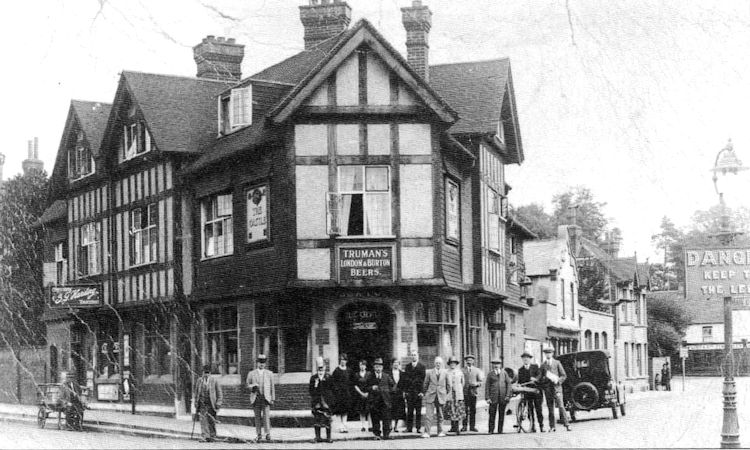
Above photo, date unknown. |
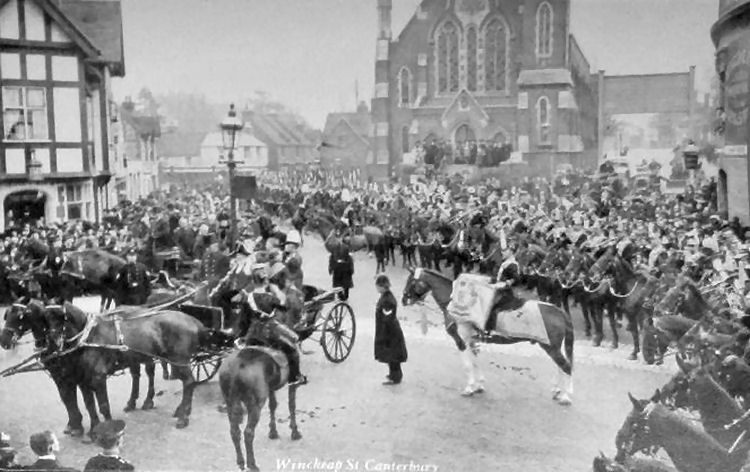
Above postcard 7th May 1910. Part of the parade which took place
around Canterbury to celebrate the accession to the throne of King
George V, kindly sent by Rory Kehoe. |
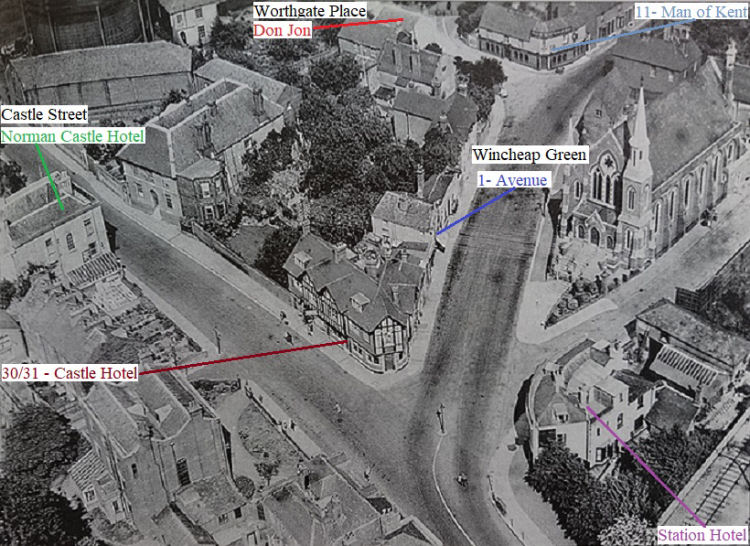
Above photo, circa 1920, kindly sent by Rory Kehoe. |
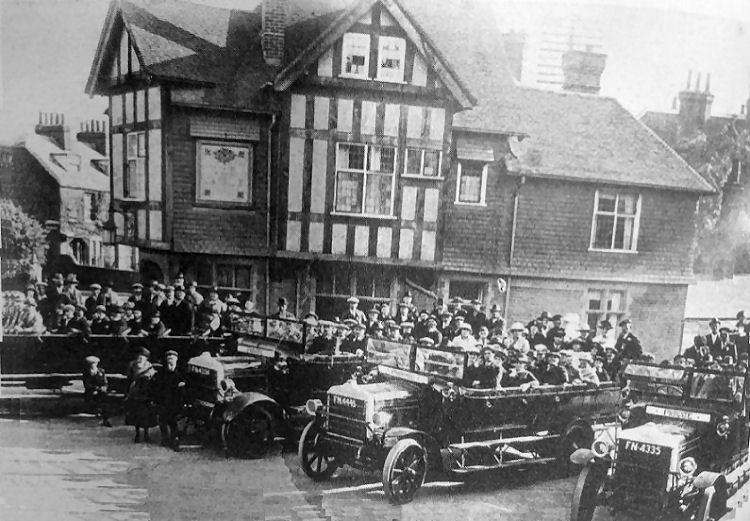
The works outing for staff of the East Kent Road Car Company, all aboard
locally registered Daimler charabancs, dated 1922. Kindly sent by Rory
Kehoe. |
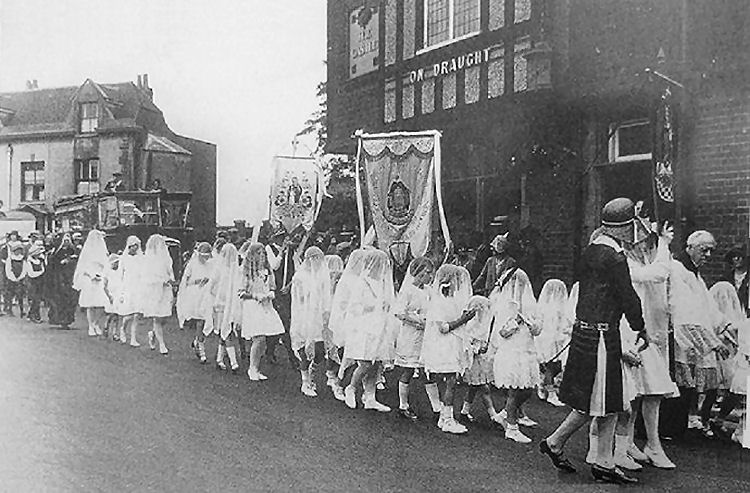
Procession of the Guild of Our Ladies of Ransom, 1923. |
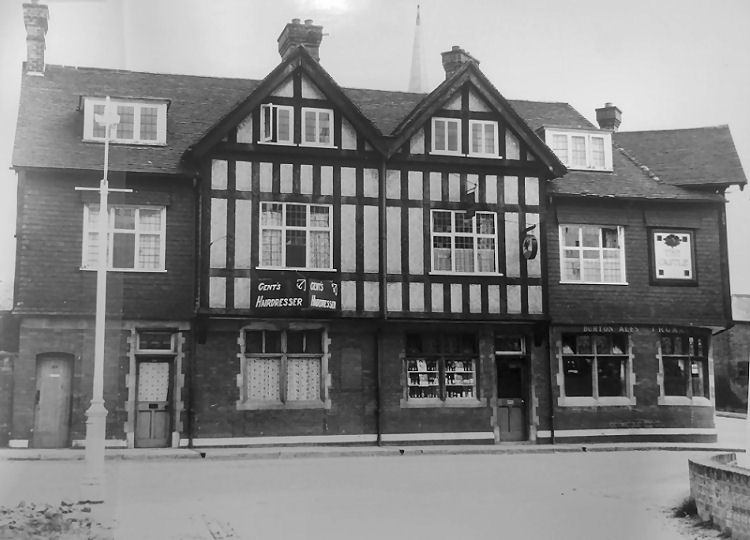
Above photo, circa 1949. Kindly sent by Rory Kehoe. |

Above photo, circa 1949, kindly sent by Rory Kehoe. |
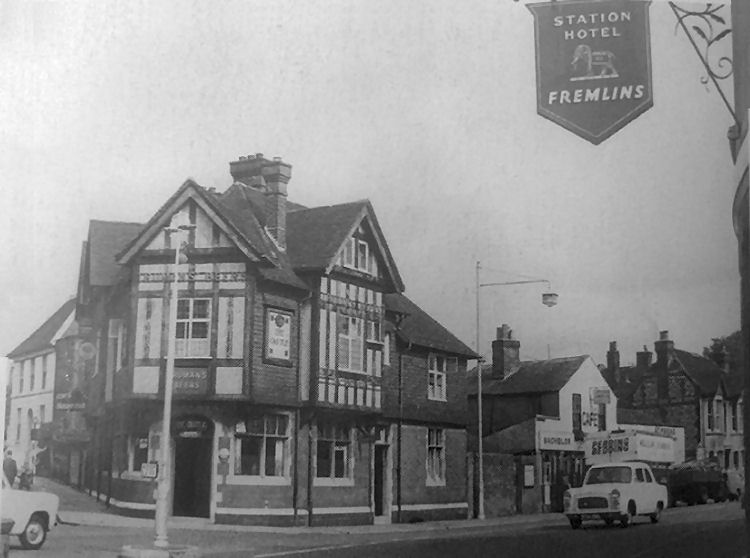 Above photo 1953, kindly sent by Rory Kehoe.
Also showing the sign of the "Station
Hotel." |
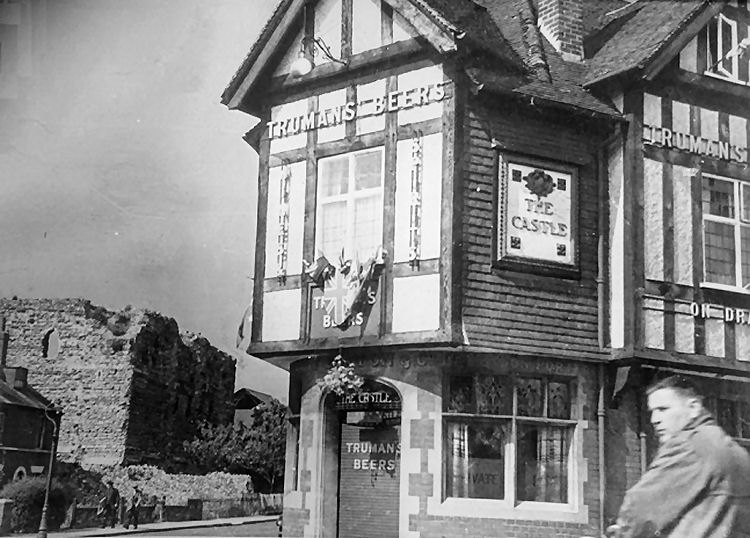
Above photo 1953, kindly sent by Rory Kehoe. |
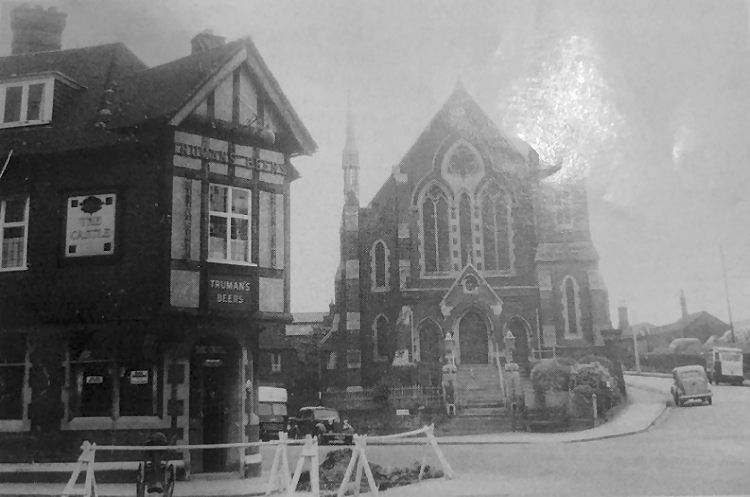
Photo circa 1955 with St. Andrew's Church (now student accommodation) in
the background. |
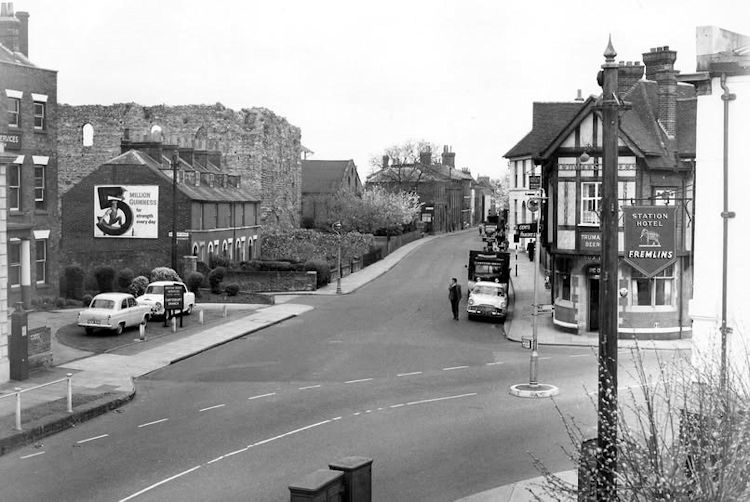
Above photo, circa 1957, kindly sent by Rory Kehoe. An unusual
photograph, taken from Wincheap railway bridge, looking east down Castle
Street. At the time, the pub was a rare outpost for Truman, Hanbury &
Buxton's Black Eagle Brewery, London E1. In the right foreground is the
Fremlin's swing sign hanging on the side of the "Station
Hotel." |

Above photo, circa 1958, kindly sent by Rory Kehoe. Showing the pub
fronting onto the main A28 and with the original "Man
of Kent" in the right background. |
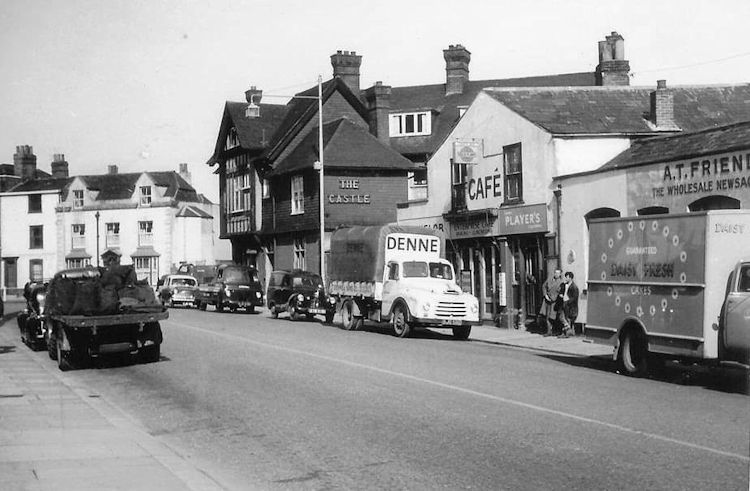
Above photo, 1960. |
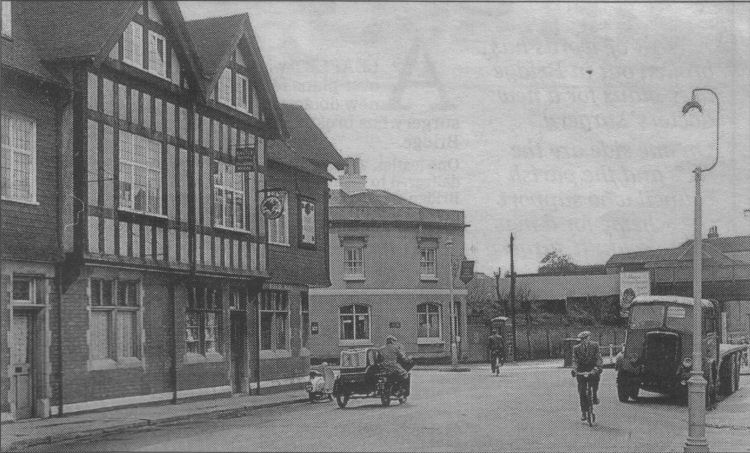
Above photo showing the "Castle Hotel" left and "Station Hotel" centre
around 1960, before the Wincheap/Rheims Way roundabout was built. |
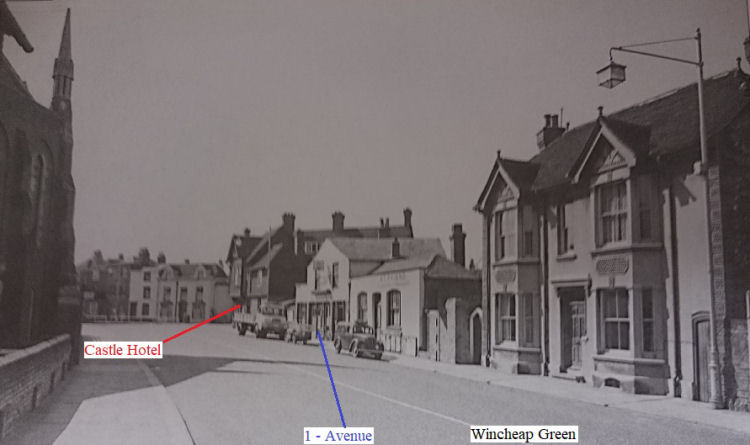
Above photo circa 1961, kindly sent by Rory Kehoe. Also showing the "Avenue." |

Above photo, circa 1961, kindly sent by Rory Kehoe.
"Castle Hotel" on the left, the "Man
of Kent" centre and just in shot on the right, the "Station
Hotel" (which later adopted the "Man
of Kent" name, when the original pub was largely demolished by ring
road works). |
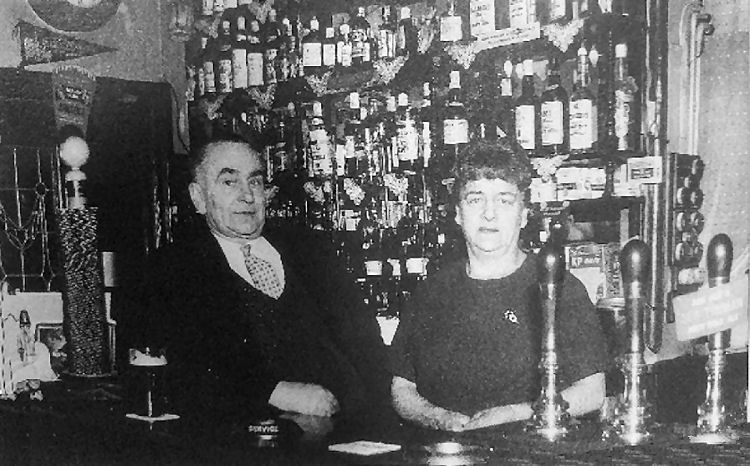
Photo 1962, showing the licensees, William & Ethel Lack, not looking
very happy in December 1962, faced with the imminent closure/demolition
of their pub. |
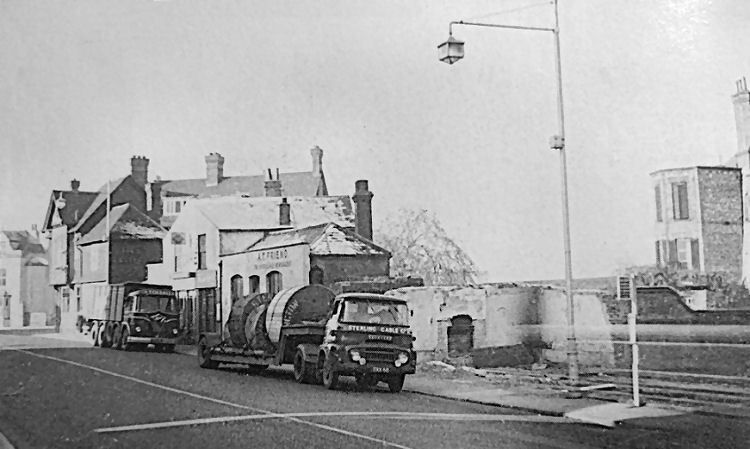
Above photo, 1963, kindly sent by Rory Kehoe. This photo was taken
just prior to the total demolition of the remainder of Wincheap Green. |
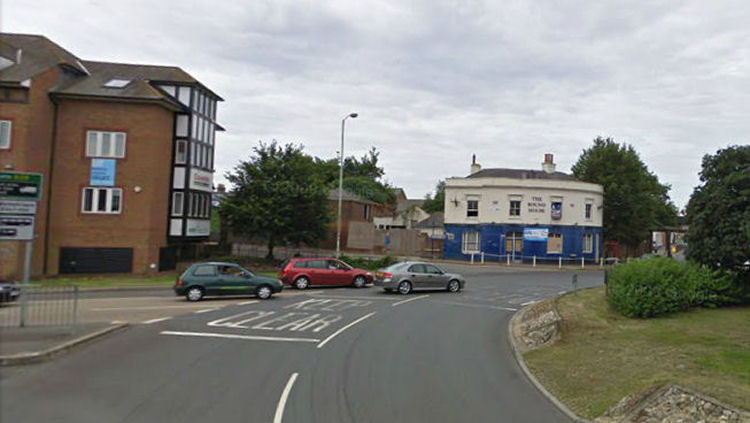
Roughly the same shot today, as taken from Google March 2009. |
Not to be confused for the "Castle
Inn" which closed around 1880 and was addressed at number 24 Castle
Street
Number 30 Castle Street has also been named as the "Victoria"
from 1882 to 1898+, so I believe there were two pubs next to each other and
some time after 1898 they merged swallowing up the "Victoria"
to make just the one premises.
|
From the Kentish Gazette, 30 January 1838.
Inquests.
An inquest was held at the "Castle Tavern," Canterbury, on Wednesday
week, before Mr. T. T. DeLasaux, coroner, on the body of
John Bird, when came to his death under the following circumstances:—
The deceased had been labouring under a severe attack of the small-pox,
which rendered him at times delirious; and in one of
these fits he had cut his throat on the Monday preceding. He was
immediately discovered, and the wound properly dressed by Mr.
Rigden, who had attended him in his sickness, but after lingering till
Wednesday he died; and Mr. Rigden being of opinion that
although the wound would not, in the event of the deceased being in
perfect health, have caused his death, still, labouring under
disease as he was, it accelerated it, the Jury returned the following
verdict:—
"Natural death, while labouring under the small-pox, accelerated by loss
of blood, he having cut his throat in a state of delirium."
|
|
Kentish Gazette, 16 July 1844.
C. SHARP, CASTLE INN, CANTERBURY,
BEGS to announce that on MONDAY, the 22nd Inst., the PIECE of PLATE
subscribed for by the Public to T. T. DeLasaux, Esq., for his exertions
in the cause of humanity, will he Presented to that Gentleman, when the
attendance of the Subscribers is respectfully invited.
The Annual TRAP MATCH will on the occasion take place in the Pleasure
Grounds, to commence at Three o’clock.
July 15, 1844.
|
|
Kentish Gazette, 23 July 1844.
Yesterday a large party of citizens and agricultural residents of the
neighbourhood met at the "Castle Inn," Canterbury, to present Mr.
Delasaux, solicitor, with a piece of plate, for his disinterested and
benevolent exertions in promoting the late inquiry at the Blean Union.
In the after evening the party, to the number of nearly 100, assembled
in the pleasure ground in the rear of the inn, and enjoyed a delightful
game at trap. The conviviality of the evening was maintained
uninterruptedly to a late hour. Mr. Ald. Masters, presided.
|
|
From the Kentish Chronicle. 13 August 1859. Price 1½d.
The “Castle Inn” Coal Club had their annual dinner on Tuesday, under
the presidency of Mr. Gunner, when a most excellent repast was served by
Mr. Sharp, and highly enjoyed by nearly 50 guests. The afternoon was
spent in a friendly game of trap-bat and the evening in harmony and
unanimity.
|
|
From the Dover Telegraph and Cinque Ports General Advertiser, Saturday 22 September, 1860.
DEATHS.
September 17th, at the "Castle Inn," Castle Street, Canterbury,
Catherine, widow of the late Mr. Charles Sharp, aged 67 years.
|
|
From the Kentish Chronicle, 15 December, 1860.
FATAL ACCIDENT ON THE RAILWAY.
On Saturday evening, Mr. T. T. Delasaux, coroner, and a respectable
jury, of whom Mr. H. Good was foreman, held an inquest at the "Castle
Inn," in this city, touching the death of Mr. John Mathar, a
sub-contractor on the London, Chatham, and Dover Railway.
The circumstances which caused the death of Mr. Mathar will be best
understood from the evidence, which we give in extenso. Mr. T. W. Hall
attended to watch the proceedings on behalf of T. R. Crampton, Esq.,
contractor; and several other officials connected with the railway were
present.
The first witness called was William Hardres, bricklayer, who
resides in Rosemary-lane. On being sworn he deposed:- To-day, about
half-past eleven o'clock, I was at work on the new brickfield bridge,
over the London, Chatham, and Dover Railway, in the parish of St. Paul.
The deceased was also there and was engaged removing some earth from
behind one of the abutments of the bridge. By some means the earth,
about a waggon load, slipped from the rear of the abutment, knocked the
deceased off and completely covered him up. Assistance was promptly
obtained, and in about six minutes he was extricated. I ran for a doctor
while this was being done, and on my return I saw the deceased, who was
then quite dead The occurrence was purely accidental, and I do not think
there were any means that could have prevented it. I have worked in many
such places, but I never saw anything come down so quickly.
In reply to
questions from the jury this witness said:—The earth was about nine or
ten feet higher than the line, but there were no bricks stacked on the
top of it. No doubt the wet weather had something to do with the earth
slipping. The deceased might have been at work about half an hour when
the accident took place. I am foreman of that part of the work.
James Clements, bricklayer, also residing in this city deposed:— I was
at work with the previous witness when the accident happened, and what
he has suited is quiet true. I assisted in getting the body out. At
first I removed the earth with a spade, but on approaching the
deceased's head I scraped it away with my hands. Just as we were getting
the earth from the body I observed a slight movement, but there were no
sign's of life afterwards. It was very dangerous to leave the earth in
the state in which it was at the time. Brick earth, like that of which
the sides of the cutting are composed is very insecure. The earth was
cut nearly perpendicularly, but not quite, and it did not look safe. I
did not tell anyone that I thought it was dangerous, but some of the men
said it was not safe. Perhaps the remark would have been made if the
deceased had not been killed.
The Coroner:— If you had considered it dangerous would you have
continued at the work?
Witness:— Not if I had noticed it particularly. The other side was quite
as perpendicular, and that is standing now, so there does not appear to
be any accounting for the accident.
My the Jury:— The earth was not leaning or undermined at all. No attempt
had been made to shore up the earth, although it was newly cut out. It
was about 10 feet deep from the top to the bottom where the bricks were
laid.
Mr. T. S. Cooper, surgeon, deposed that he was sent for to see the
deceased between eleven and twelve o’clock, he found the body near the
station of the Loudon, Chatham, and Dover Railway, on a truck on the
line of rails. The deceased was quite dead, having evidently been
suffocated. From the appearance of the body and the evidence adduced, he
believed death was caused by suffocation. No doubt he had received
sufficient injuries to cause death even if he had not been suffocated.
The Coroner having summed up, the jury returned a verdict of "Accidental
Death."
We understand that the deceased has left a widow and seven children, but
fortunately he had insured his life, only five days previous to the
melancholy occurrence, for £250. He had also effected two other
insurances amounting to £500.
|
|
From the Kentish Chronicle, 29 June, 1861.
INQUEST.
Mr. Delasaux held an inquiry on Monday evening, in the “Castle”
public-house, Canterbury, on the body or Caroline Lucas, an aged woman,
who was discovered dead in her bed. Mr. T. S. Cooper said that he had
seen the deceased, whose body presented no appearance of external
injury; and that the cause of her death, in his opinion, was disease of
the heart. The jury returned a verdict in accordance with the evidence. |
|
From the Kentish Chronicle, 29 March, 1862.
CANTERBURY POLICE COURT. Monday.
Richard Glover, a servant in the employ of William Beck, landlord of the
“Castle Inn,” Castle-street, was charged with stealing half a pint of
rum, value 1s., 4d, the properly of his master. The prisoner pleaded
guilty, and was sentenced to a month’s imprisonment.
|
|
From the Kentish Chronicle, 10 May, 1862.
THE TRAP-BAT CLUB.
These favourite resorts of the Canterbury citizens on summer evening
have commenced their meetings. And in each case seem to augur well for
successful seasons. The most ancient of them, the “Beverley,” held its
first meeting at the “Beverley Arms,” St. Stephen's, on Monday evening,
the 28th of April. The St. Thomas Hill Club, held at the “City of
Canterbury Tavern,” opened the campaign on May-day. The “Castle Inn”
Club commenced its meetings in the beautiful orchard of the “Castle
Inn,” on Monday evening last, the 5th inst.; and the next evening
(Tuesday) a good muster of the members of the “Harbledown Club”
assembled on the tap-green of the “Coach and Horses Inn,” which with the
pretty gardens attached, have been got into very nice order by the new
landlord, Mr. R. Eldridge.
|
|
From the Kentish Gazette, 1 August 1865.
The "Castle Inn," Castle Street.
The license of this well known inn was, on Thursday, transferred
from Miss Eliza Beck to Mr. J. H. Robins, and the house is
undergoing a thorough repair.
|
|
Canterbury Journal, Kentish Times and Farmers' Gazette, Saturday 10 November 1866.
James H. Robbins. The "Castle Inn," Castle Street, Canterbury, soda
water, lemonade, and aerated water manufacturer.
J. H. R. begs to announce that he has commenced the above business with
the most powerful and latest improve machinery, including S. Barnett's
Prize Medal Bottling Apparatus and Dial Pressure Indicator, with which
appliances he is now prepared to meet any demand, however large, with a
superior article, and always of the same quality.
All orders probably attended to. Bottles, hampers, and cases to be
returned, or paid for.
|
|
From the Whitstable Times and Herne Bay Herald, Saturday 5 January, 1867. Price 1d.
JAMES H. ROBINS. THE CASTLE INN,
CASTLE-STREET, CANTERBURY,
SODA WATER, LEMONADE, AND AERATED WATER MANUFACTURER.
J. H. R. begs to announce that he has commenced the above business with
the most powerful and latest-improved machinery, including S. Barnett's
Prize Medal Bottling Apparatus and Dial Pressure Indicator, with which
appliances he is now prepared to meet any demand, however large, with a
superior article, and always of the same quality. All orders promptly attended to. Bottles, hampers, and cases to be
returned, or paid for. |
|
From the Whitstable Times and Herne Bay Herald. 9 November 1867. Price 1d.
INQUEST
An inquest was held on Saturday evening last at the "Castle Inn," on the
body of Samuel Murdock, who expired on Saturday morning. The following
evidence was adduced:—
George Andrews, watchman to Messrs. Ash, brewers, deposed that the
deceased was gardener in the same employ; and came to work at 6 o'clock
that morning, when he appeared to be in his usual state of health. He
saw deceased again about 20 minutes after in the greenhouse, and spoke
to him. Lucy Maria Moyes stated that deceased had lodged with her for about 18
months. He went to work at 6 o'clock that morning, and soon after 8
o'clock returned to breakfast, and complained of a pain in his back.
Deceased had a cup of tea and a mustard poultice on his chest, which
appeared to relieve him. At eleven o'clock he had a biscuit and a glass
of warm brandy and water, after which he sat down, and almost instantly
expired. Mr. Hallowes, surgeon, stated that he was called in to deceased between
11 and 12 that morning, and found him dead, in a chair. He carefully
examined the body, and he had no hesitation in saying that the deceased
died from heart disease, which is a natural death. The jury returned a verdict of “Natural death.” |
|
From the Whitstable Times, 30 December, 1944.
Miner Steals Dominoes.
CANTERBURY LICENSEE ROBBED.
The theft of a set of dominoes, valued at 3/-, from Robert Charles
Bloxome, on November 25th, was admitted by 30-years-old Cyril Morgan, of
34, Milner Crescent, Aylesham, when he appeared at Friday’s session of
the Canterbury Magistrates' Court.
The magistrates were Mr. Silas, Williamson (Chairman), Mr Frank Hooker
and Mr Wright Hunt.
Detective Inspector Pierce explained that Mr. Bloxome was the licensee
of the "Castle" public house, Canterbury, and he was in the habit of
loaning sets of dominoes to people in the club room. Naturally, he
expected them to be returned. On November 25th defendant borrowed a set
and did not return it. It was still missing when Mr. Bloxome closed at
10 p.m.
The matter was reported to the Aylesham police and at 5 p.m. on December
6th Morgan was seen at his home by P.S. Feasey. Defendant denied any
knowledge of the affair and said he had no dominoes. Further questioned
and cautioned, Morgan produced a box of dominoes from the top of a
cupboard in the kitchen, saying "Here they are." In a statement
defendant said: "Last Saturday week I went into the "Castle" with a few
friends. I borrowed the dominoes off the landlord and had a few drinks.
After we had finished playing I put the dominoes in my pocket to knock
off."
Morgan told the justices that he meant to take the dominoes back but was
frightened.
Questioned by the Magistrates’ Clerk (Mr. J. A. Godley) about the phrase
in his statement ..."I put the dominoes in my pocket to knock off,"
defendant said what he meant was that he put the dominoes in his pocket
so that he could take them back at "knock-off" time.
The Chairman: Why didn't you do the honest thing and tell somebody?
Morgan: That should have been done.
Inspector Pierce said that Morgan was a married man with three children
and was employed as a coal ripper at Snowdown Colliery. He was described
as "a spasmodic worker" and "of intemperate habits." On July 13th, 1939,
he was bound over for two years at the Wingham Petty Sessions for
larceny of ducks. There were three other convictions for minor offences
such as being drunk.
Morgan was fined £2, to be paid within a month, or a month’s
imprisonment the Chairman warning him that he was lucky to get off
prison.
|
LICENSEE LIST
BECK Eliza Miss to Aug/1865
ROBINS J H Mr Aug/1865+
LLOYD Arthur 1913+

SOLLY William 1917-22+

LEAVERS Edward Henry 1930+

BLOXSOME Robert Charles 1938-44+

LACK William & Ethel to Dec/1962
https://pubwiki.co.uk/Castle.shtml
 Census Census
 From the Post Office Directory 1913 From the Post Office Directory 1913
 From the Post Office Directory 1922 From the Post Office Directory 1922
 From the Post Office Directory 1930 From the Post Office Directory 1930
 From the Post Office Directory 1938 From the Post Office Directory 1938
 Historic
Canterbury web site www.machadoink.com Historic
Canterbury web site www.machadoink.com
 South Eastern Gazette South Eastern Gazette
|


















